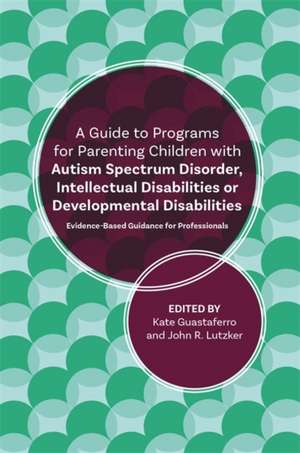A Guide to Programs for Parenting Children with Autism Spectrum Disorder, Intellectual Disabilities or Developmental Disabilities
Autor John R Lutzker, Katelyn M Guastaferroen Limba Engleză Paperback – 21 iun 2018
Parents or primary caregivers spend the most time with a child, and training them in behaviour management and intervention strategies is critical to improving a child's behaviour, to helping them to learn new skills, and to reduce parental stress. Authored by eminent specialists in the field and written for researchers and clinicians supporting or treating families, each chapter focuses on one of the key evidence-based parent training programs - from Incredible Years(R) and Positive Family Intervention through to Pivotal Response Treatment and Acceptance and Commitment Therapy. Each chapter provides a breakdown that features an introduction to the model, evidence for the model, a full description of the model, a discussion of implementation and dissemination efforts, and concluding comments. Grounded in research, this definitive overview provides the evidence and guidance required for anyone considering investing in or running a parenting program.
Preț: 380.38 lei
Preț vechi: 525.08 lei
-28% Nou
Puncte Express: 571
Preț estimativ în valută:
72.78€ • 76.20$ • 60.23£
72.78€ • 76.20$ • 60.23£
Carte disponibilă
Livrare economică 17-31 martie
Preluare comenzi: 021 569.72.76
Specificații
ISBN-13: 9781785927355
ISBN-10: 1785927353
Pagini: 272
Dimensiuni: 156 x 230 x 17 mm
Greutate: 0.36 kg
Editura: JESSICA KINGSLEY PUBLISHERS
ISBN-10: 1785927353
Pagini: 272
Dimensiuni: 156 x 230 x 17 mm
Greutate: 0.36 kg
Editura: JESSICA KINGSLEY PUBLISHERS
Cuprins
Introduction. Chapter 1: Pivotal Response Treatment and Parent Education. Lynn K. Koegel, professor, Stanford School of Medicine, Brittany L. Koegel, & Robert L. Koegel, researcher, Psychology and Behavioral Sciences at Stanford University. Chapter 2: Positive Family Intervention: Using Optimism to Overcome Obstacles to Successful Parenting. V. Mark Durand, professor, University of South Florida St. Petersburg, Shelley Clarke, research associate, University of South Florida-Tampa, & Julia Strauss, graduate assistant, Vanderbilt University. Chapter 3: Incredible Years Training for Families with Children with Developmental Disabilities, Laura Lee McIntyre, professor, University of Oregon & Mallory Brown, psychologist. Chapter 4: The Early Start Denver Model: Parent Adaptation. Melissa A. Mello, therapist and trainer at the MIND Institute, Meagan R. Talbott, postdoctoral fellow, UC Davis MIND Institute, & Sally J. Rogers. Chapter 5: Padres en Acción: A parent education program for Latino parents of children with ASD. Sandy Magana, professor, University of Texas at Austin, Wendy Machalicek, professor, Department of Special Education and Clinical Sciences at the University of Oregon, Kristina Lopez, assistant professor, School of Social Work at Arizona State University, & Emily Iland, adjunct professor, Department of Special Education at California State University, Northridge. Chapter 6: Effective Delivery of PCIT with Children who have an Intellectual and Developmental Disorder. Susan G. Timmer, research scientist, University of California Davis, Brandi Hawk, psychologist, University of California Davis, & Anthony J. Urquiza, professor, University of California Davis. Chapter 7: A Parent Education Program Designed to Enhance the Developmental Growth of Infants at-risk for Autism. Ronit M. Molko-Harpaz, founder, Empowering Synergy Inc, & Kate Guastaferro, assistant research professor, The Pennsylvania State University. Chapter 8: Using Acceptance and Commitment Therapy for Parents of Children with Autism Spectrum Disorder. Kenneth Fung, clinical director, Asian Initiative in Mental Health Program at the Toronto Western Hospital, Lee Steel, coordinator, Extend-A-Family, Kelly Bryce, nurse, Surrey Place Center, Johanna Lake, psychologist, York University, & Yona Lunsky, professor, Department of Psychiatry at the University of Toronto.
Descriere
Parents require effective training in order to support children with intellectual or developmental disabilities, including Autism Spectrum Disorder. In this book, leading authorities outline the research and evidence which underpins major parenting training programs, and provide guidance on how to effectively implement and adapt them in practice
